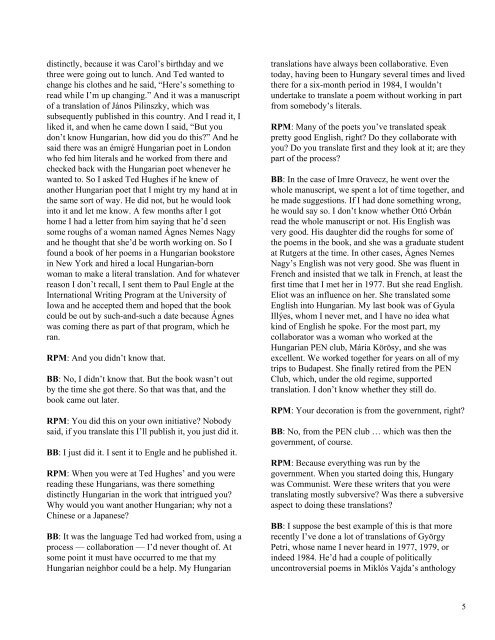their - The University of Texas at Dallas
their - The University of Texas at Dallas
their - The University of Texas at Dallas
You also want an ePaper? Increase the reach of your titles
YUMPU automatically turns print PDFs into web optimized ePapers that Google loves.
distinctly, because it was Carol’s birthday and we<br />
three were going out to lunch. And Ted wanted to<br />
change his clothes and he said, “Here’s something to<br />
read while I’m up changing.” And it was a manuscript<br />
<strong>of</strong> a transl<strong>at</strong>ion <strong>of</strong> János Pilinszky, which was<br />
subsequently published in this country. And I read it, I<br />
liked it, and when he came down I said, “But you<br />
don’t know Hungarian, how did you do this” And he<br />
said there was an émigré Hungarian poet in London<br />
who fed him literals and he worked from there and<br />
checked back with the Hungarian poet whenever he<br />
wanted to. So I asked Ted Hughes if he knew <strong>of</strong><br />
another Hungarian poet th<strong>at</strong> I might try my hand <strong>at</strong> in<br />
the same sort <strong>of</strong> way. He did not, but he would look<br />
into it and let me know. A few months after I got<br />
home I had a letter from him saying th<strong>at</strong> he’d seen<br />
some roughs <strong>of</strong> a woman named Ágnes Nemes Nagy<br />
and he thought th<strong>at</strong> she’d be worth working on. So I<br />
found a book <strong>of</strong> her poems in a Hungarian bookstore<br />
in New York and hired a local Hungarian-born<br />
woman to make a literal transl<strong>at</strong>ion. And for wh<strong>at</strong>ever<br />
reason I don’t recall, I sent them to Paul Engle <strong>at</strong> the<br />
Intern<strong>at</strong>ional Writing Program <strong>at</strong> the <strong>University</strong> <strong>of</strong><br />
Iowa and he accepted them and hoped th<strong>at</strong> the book<br />
could be out by such-and-such a d<strong>at</strong>e because Ágnes<br />
was coming there as part <strong>of</strong> th<strong>at</strong> program, which he<br />
ran.<br />
RPM: And you didn’t know th<strong>at</strong>.<br />
BB: No, I didn’t know th<strong>at</strong>. But the book wasn’t out<br />
by the time she got there. So th<strong>at</strong> was th<strong>at</strong>, and the<br />
book came out l<strong>at</strong>er.<br />
RPM: You did this on your own initi<strong>at</strong>ive Nobody<br />
said, if you transl<strong>at</strong>e this I’ll publish it, you just did it.<br />
BB: I just did it. I sent it to Engle and he published it.<br />
RPM: When you were <strong>at</strong> Ted Hughes’ and you were<br />
reading these Hungarians, was there something<br />
distinctly Hungarian in the work th<strong>at</strong> intrigued you<br />
Why would you want another Hungarian; why not a<br />
Chinese or a Japanese<br />
BB: It was the language Ted had worked from, using a<br />
process — collabor<strong>at</strong>ion — I’d never thought <strong>of</strong>. At<br />
some point it must have occurred to me th<strong>at</strong> my<br />
Hungarian neighbor could be a help. My Hungarian<br />
transl<strong>at</strong>ions have always been collabor<strong>at</strong>ive. Even<br />
today, having been to Hungary several times and lived<br />
there for a six-month period in 1984, I wouldn’t<br />
undertake to transl<strong>at</strong>e a poem without working in part<br />
from somebody’s literals.<br />
RPM: Many <strong>of</strong> the poets you’ve transl<strong>at</strong>ed speak<br />
pretty good English, right Do they collabor<strong>at</strong>e with<br />
you Do you transl<strong>at</strong>e first and they look <strong>at</strong> it; are they<br />
part <strong>of</strong> the process<br />
BB: In the case <strong>of</strong> Imre Oravecz, he went over the<br />
whole manuscript, we spent a lot <strong>of</strong> time together, and<br />
he made suggestions. If I had done something wrong,<br />
he would say so. I don’t know whether Ottó Orbán<br />
read the whole manuscript or not. His English was<br />
very good. His daughter did the roughs for some <strong>of</strong><br />
the poems in the book, and she was a gradu<strong>at</strong>e student<br />
<strong>at</strong> Rutgers <strong>at</strong> the time. In other cases, Ágnes Nemes<br />
Nagy’s English was not very good. She was fluent in<br />
French and insisted th<strong>at</strong> we talk in French, <strong>at</strong> least the<br />
first time th<strong>at</strong> I met her in 1977. But she read English.<br />
Eliot was an influence on her. She transl<strong>at</strong>ed some<br />
English into Hungarian. My last book was <strong>of</strong> Gyula<br />
Illýes, whom I never met, and I have no idea wh<strong>at</strong><br />
kind <strong>of</strong> English he spoke. For the most part, my<br />
collabor<strong>at</strong>or was a woman who worked <strong>at</strong> the<br />
Hungarian PEN club, Mária Körösy, and she was<br />
excellent. We worked together for years on all <strong>of</strong> my<br />
trips to Budapest. She finally retired from the PEN<br />
Club, which, under the old regime, supported<br />
transl<strong>at</strong>ion. I don’t know whether they still do.<br />
RPM: Your decor<strong>at</strong>ion is from the government, right<br />
BB: No, from the PEN club … which was then the<br />
government, <strong>of</strong> course.<br />
RPM: Because everything was run by the<br />
government. When you started doing this, Hungary<br />
was Communist. Were these writers th<strong>at</strong> you were<br />
transl<strong>at</strong>ing mostly subversive Was there a subversive<br />
aspect to doing these transl<strong>at</strong>ions<br />
BB: I suppose the best example <strong>of</strong> this is th<strong>at</strong> more<br />
recently I’ve done a lot <strong>of</strong> transl<strong>at</strong>ions <strong>of</strong> György<br />
Petri, whose name I never heard in 1977, 1979, or<br />
indeed 1984. He’d had a couple <strong>of</strong> politically<br />
uncontroversial poems in Miklós Vajda’s anthology<br />
5

















